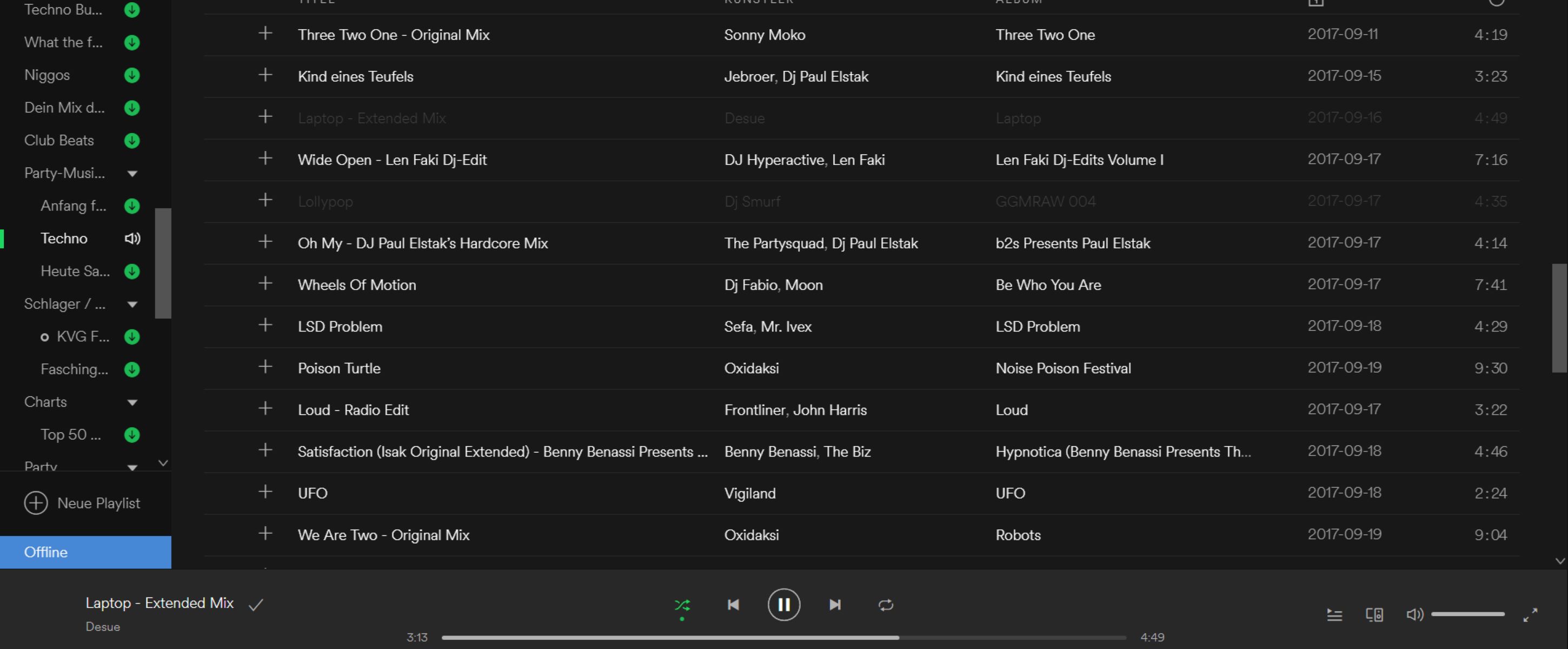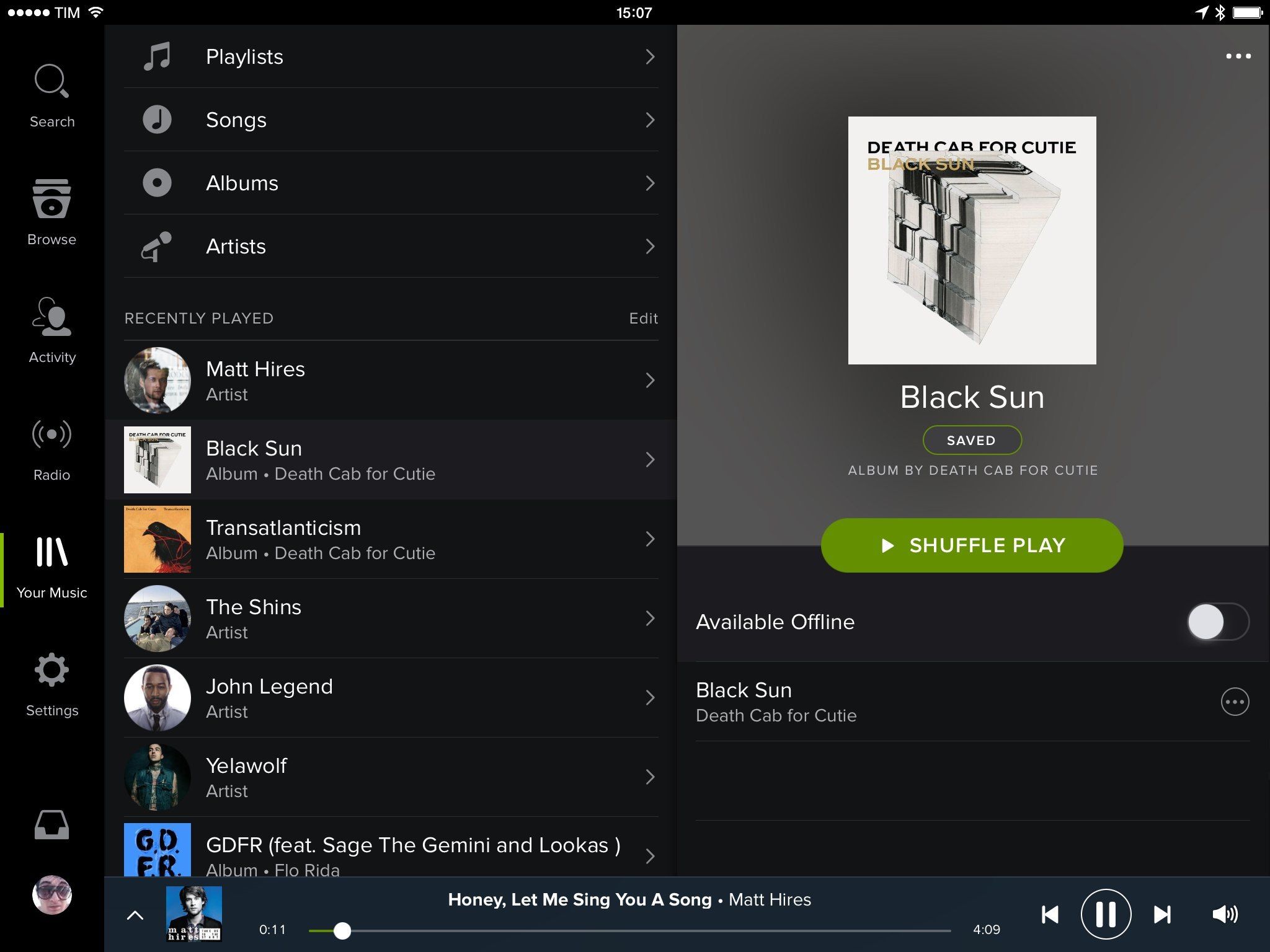Introduction
Spotify, the popular music streaming platform, has revolutionized the way we consume music. With an extensive library of millions of songs and a personalized recommendation system, Spotify provides a customized music experience for each user. However, many users have noticed that Spotify often plays the same songs repeatedly, leaving them wondering why this repetition occurs.
Understanding the reasons behind Spotify’s tendency to play the same songs can shed light on the inner workings of its music recommendation algorithm. This algorithm is the driving force behind Spotify’s ability to suggest songs that align with users’ tastes and preferences. By considering factors such as user listening habits, music genre, popularity, and collaborative filtering, Spotify aims to deliver a tailored music experience for each individual.
Throughout this article, we will explore the various factors that contribute to Spotify’s repetition of songs, as well as the challenges and limitations faced by its algorithm. We will delve into the role of user preferences and listening habits, the impact of personalized playlists like “Discover Weekly” and “Release Radar,” and the techniques of collaborative filtering and user-based recommendations. It is important to note that while Spotify aims to provide a diverse and enjoyable music experience, some degree of repetition is inevitable due to algorithmic limitations.
By gaining insight into Spotify’s music recommendation system, we can better understand why certain songs are played repeatedly and how these patterns contribute to the overall user experience. So, let’s embark on this journey to unravel the mysteries behind Spotify’s music recommendations and why it sometimes feels like we’re stuck in a loop!
The Role of Algorithms in Spotify’s Music Recommendation System
In order to understand why Spotify tends to play the same songs, it is important to examine the role of algorithms in its music recommendation system. Spotify employs a complex algorithm that analyzes various data points to curate personalized playlists for its users.
The algorithm takes into account multiple factors, such as user listening habits, music genre, popularity, and collaborative filtering, to generate song recommendations. By analyzing a user’s past listening behavior, Spotify can understand their preferences and tailor its song suggestions accordingly.
One of the key factors considered by Spotify’s algorithm is user listening habits. The platform takes into account the songs users have previously listened to, how frequently they play specific tracks, and the duration of their listening sessions. This data helps Spotify understand an individual’s preferred music style and their inclination towards specific artists or genres.
Moreover, the algorithm also gives importance to music genre and popularity. Spotify categorizes songs into various genres and sub-genres, allowing users to explore different styles. Popular and trending songs within specific genres are often given more visibility and recommended to a wider audience. Consequently, these popular songs may be played more frequently, leading to a perception of repetition.
Another key feature in Spotify’s recommendation system is the “Discover Weekly” playlist. This curated playlist, updated every Monday, combines the user’s listening history with songs that have been well-received by other Spotify users with similar taste. By utilizing collaborative filtering techniques, Spotify identifies patterns and similarities among users’ preferences, making song recommendations based on shared interests. While this personalized approach enhances the music discovery experience, it may also result in songs being repeated within a specific user’s playlist.
In addition to the “Discover Weekly” playlist, Spotify’s algorithm generates the “Release Radar” playlist, which is updated every Friday and includes new releases from artists that the user follows or has shown interest in. This playlist aims to keep users updated with the latest music from their favorite artists. However, if a user follows only a limited number of artists, they might encounter repeated songs within their “Release Radar” playlist.
It’s essential to recognize that algorithmic limitations also play a role in the repetition of songs on Spotify. The algorithm relies on the available data to make accurate recommendations, and if a user has a limited listening history or preferences that are not easily discernible, the algorithm may struggle to provide diverse suggestions.
To provide a rich and varied music experience, Spotify continuously fine-tunes its algorithm to balance personalized recommendations with a fresh selection of songs. This ongoing refinement aims to address the issue of repetitive playlists and keep users engaged with diverse music options.
User Preferences and Listening Habits
When it comes to Spotify’s music recommendation system, user preferences and listening habits play a crucial role in determining the songs that are frequently played. Spotify analyzes user behavior and data to gain insights into individual preferences, allowing the algorithm to generate personalized playlists.
One of the key factors influencing the repetition of songs is the user’s personal preferences. Spotify takes into account the songs users have liked, saved, or added to their library. By considering these selections, the algorithm identifies patterns and tries to provide similar songs that align with the user’s taste.
Moreover, the frequency with which users play specific tracks also affects the song repetition on Spotify. If a user repeatedly listens to certain songs or artists, the algorithm takes note of these preferences and is likely to include those songs in the recommendation list. This can create a perception of repetition, as the algorithm tries to cater to the user’s preferences and offer them what they enjoy listening to the most.
Additionally, the duration of a user’s listening session influences the song repetition on Spotify. If a user has shorter listening sessions or tends to listen to a limited number of songs during each session, the algorithm may have a smaller pool of songs to choose from. As a result, it might resort to playing the same songs more frequently to ensure a continuous stream of music.
Another factor that impacts song repetition is the interaction users have with their playlists. If a user frequently skips a particular song or adds it to their ‘Disliked’ category, the algorithm learns from this feedback and adjusts its recommendations accordingly. However, if a user tends to skip songs randomly without indicating any specific preference, the algorithm may interpret this behavior as a lack of interest and resort to replaying previously listened-to songs.
It is worth noting that song repetition is not entirely avoidable, as the algorithm tries to strike a balance between catering to user preferences and providing a diverse range of songs. The aim is to deliver an enjoyable and tailored music experience, but it can be challenging to find the perfect equilibrium.
To mitigate the repetition of songs, Spotify encourages users to actively engage with its features. By liking, saving, and exploring new songs, users can help diversify their listening experience and provide the algorithm with more data to work with. Additionally, regularly exploring playlists curated by Spotify, such as ‘Daily Mixes’ and ‘Your Library,’ can lead to the discovery of new and exciting music.
Ultimately, understanding how user preferences and listening habits influence Spotify’s music recommendation system can help users make the most of their music streaming experience. By actively participating in the exploration of new songs and interacting with the platform’s features, users can enhance the variety and freshness of their playlists.
Music Genre and Popularity
Music genre and popularity are significant factors in Spotify’s music recommendation system and contribute to the perception of song repetition. The algorithm takes into account the genre preferences of users and the popularity of specific songs to curate personalized playlists.
Spotify categorizes songs into various genres and sub-genres, allowing users to explore music based on their preferred styles. When users listen to songs within a particular genre, the algorithm takes note of their preferences and tries to suggest similar tracks. Consequently, users may encounter repeated songs within their chosen genre, as the algorithm aims to cater to their specific taste.
Moreover, the popularity of songs within a genre plays a role in song repetition on Spotify. The algorithm considers the number of listens, likes, and saves a song has received to gauge its popularity. Popular songs have a higher chance of being recommended to a wider audience, as Spotify seeks to provide a balanced mix of familiar and new music.
While popularity and genre-based recommendations contribute to the discovery of new songs and artists, they can also lead to a perception of repetition. If a song becomes especially popular within a specific genre or among a certain group of listeners, it may feature frequently in playlists and radio stations tailored to those preferences.
It is essential to recognize that genres can have sub-genres and variations that may overlap. This overlapping nature can further contribute to the repetition of songs. For example, if a user enjoys listening to a specific sub-genre, such as “indie rock,” they may encounter repeated songs within their chosen sub-genre, as the algorithm tries to provide a satisfying listening experience within that genre.
To mitigate the impact of music genre and popularity on song repetition, Spotify provides various features to encourage music exploration. The “Discover” section highlights new releases, curated playlists, and recommended songs outside of a user’s usual genre preferences. Additionally, browsing different playlists and exploring genres outside of one’s comfort zone can introduce listeners to a more diverse selection of music.
Ultimately, music genre and popularity are important factors in Spotify’s music recommendation system. While they contribute to song repetition, they also play a crucial role in introducing users to new artists, genres, and songs they may not have discovered otherwise. By embracing music exploration and tapping into Spotify’s diverse library, users can expand their musical horizons and enjoy a more varied listening experience.
The “Discover Weekly” Playlist
One of the key features of Spotify’s music recommendation system that can contribute to the repetition of songs is the “Discover Weekly” playlist. Launched in 2015, this playlist aims to introduce users to new music tailored to their individual preferences.
The “Discover Weekly” playlist is updated every Monday and consists of approximately 30 songs that Spotify’s algorithm selects based on a user’s listening history and behavior. By analyzing the songs a user has listened to and liked, as well as considering the preferences of users with similar music taste, the algorithm creates a curated playlist with the intention of introducing users to new artists, songs, and genres.
The “Discover Weekly” playlist is powered by collaborative filtering techniques. These techniques analyze patterns and similarities between users with similar musical preferences, looking for songs that one user might like based on the listening behavior of others. Through this approach, Spotify attempts to deliver personalized music recommendations that align with a user’s taste.
As with any recommendation system, the “Discover Weekly” playlist can result in song repetition. If a user has a particular song or artist that they listen to frequently, there may be a higher chance of those songs appearing in their “Discover Weekly” playlist. This repetition occurs because the algorithm follows the user’s preferences and aims to provide music that aligns with their taste.
However, it should be noted that the “Discover Weekly” playlist is not solely focused on repeating songs. Spotify’s algorithm actively aims to strike a balance between introducing users to new music and incorporating familiar songs that they may not have discovered or listened to extensively. This blend of new and familiar tracks enhances the overall listening experience and provides users with a playlist that keeps them engaged.
To make the most of the “Discover Weekly” playlist and minimize song repetition, users can actively engage with the songs within the playlist. By liking or saving the songs they enjoy, users provide feedback to the algorithm, indicating their preferences and influencing future recommendations.
Furthermore, users can also explore other Spotify features, such as “Daily Mixes” and “Your Library,” to discover new songs outside of the “Discover Weekly” playlist. These features add diversity to a user’s music selection and reduce the chances of hearing the same songs repeatedly.
In summary, while the “Discover Weekly” playlist can contribute to song repetition, it is designed to strike a balance between introducing users to new music and including familiar tracks. By actively engaging with the playlist and exploring other features, users can enhance their overall music discovery experience and enjoy a variety of songs that cater to their individual tastes.
The Impact of Personalized Playlists
Personalized playlists have become a cornerstone of Spotify’s music recommendation system, offering users a curated selection of songs tailored to their unique preferences. These playlists, such as “Discover Weekly,” “Daily Mixes,” and “Your Library,” have a significant impact on the overall music experience and can contribute to the perception of song repetition.
With the help of advanced algorithms, Spotify analyzes users’ listening behavior, likes, saves, and other interactions to generate personalized playlists. These playlists aim to provide a seamless listening experience by combining familiar songs with new and interesting discoveries.
Personalized playlists can lead to song repetition due to the algorithm’s focus on delivering content that aligns with a user’s musical taste. If a user has a strong preference for a specific genre, artist, or even a particular song, there is a higher chance of encountering repeated tracks within their personalized playlists.
However, it is crucial to understand that the repetition within personalized playlists is often a result of individual preferences and listening habits. The algorithm aims to strike a delicate balance between offering familiar songs that users enjoy and introducing them to new music. This combination provides a diverse listening experience while still catering to the user’s preferences.
The impact of personalized playlists extends beyond song repetition. They help users discover new artists, genres, and songs that they may not have come across otherwise. By analyzing a user’s listening history and behavior, Spotify can suggest tracks that are likely to resonate with their taste, fostering a sense of musical exploration and variety.
Moreover, personalized playlists like “Discover Weekly” and “Daily Mixes” adapt and evolve based on a user’s interactions and feedback. The more users engage with these playlists by liking, saving, or skipping songs, the better the algorithm becomes at refining recommendations and reducing song repetition.
To mitigate the impact of song repetition in personalized playlists, Spotify offers several features to enhance music discovery. Users can explore different genres, dive into curated playlists, and follow specific artists or genres they are interested in, thereby expanding the pool of songs from which personalized recommendations are drawn.
In summary, while personalized playlists can contribute to song repetition, they play a pivotal role in Spotify’s music recommendation system. By tailoring playlists to individual preferences, Spotify enhances the overall music experience, facilitating both musical exploration and enjoyment. By actively engaging with personalized playlists and utilizing the various music discovery features offered by Spotify, users can ensure a more diverse and fulfilling listening experience.
Collaborative Filtering and User-Based Recommendations
Collaborative filtering is a key technique employed by Spotify’s music recommendation system to provide personalized song suggestions. By considering the preferences and behavior of similar users, the algorithm generates recommendations based on the concept that if two users have similar tastes, they are likely to enjoy similar music.
When it comes to collaborative filtering, Spotify analyzes patterns and similarities among users’ listening habits, including the songs they like, save, and listen to frequently. By identifying commonalities and shared interests, the algorithm generates recommendations that align with a user’s taste and preferences.
User-based recommendations are built on the principle that users with similar music preferences often exhibit similar behavior. Spotify captures this similarity by looking at the listening history of users who have similar musical tastes and incorporates their preferences into the recommendation engine.
While collaborative filtering and user-based recommendations promote music discovery and can lead to personalized song suggestions, they can also contribute to the repetition of songs. If a user shares similar taste with another user who frequently listens to a specific song or artist, there is a higher likelihood that the algorithm will recommend those songs to the other user as well, resulting in song repetition.
However, it’s important to note that the algorithm attempts to strike a balance between offering new and familiar music. By incorporating collaborative filtering techniques, Spotify takes into account both the novelty factor and the similarities between users, ensuring that the recommendations include a mix of popular songs and hidden gems that users may have missed.
To address the issue of song repetition, Spotify actively encourages user engagement and feedback. By liking, saving, or skipping songs, users provide the algorithm with valuable information to refine recommendations over time. The more users actively interact with the recommendation system, the better the algorithm becomes at minimizing repetition and providing diverse and engaging playlists.
In addition to collaborative filtering, Spotify also takes into account individual listening preferences and personalizes recommendations based on a user’s specific taste. By analyzing a user’s listening history and behavior, Spotify can identify patterns and preferences unique to them, ensuring that the algorithm tailors song suggestions to their individual musical journey.
While there may be instances of song repetition resulting from collaborative filtering and user-based recommendations, they are essential components of Spotify’s music recommendation system. By leveraging the musical preferences of similar users and incorporating individual listening habits, Spotify aims to provide a personalized and rewarding music experience for all its users.
The Release Radar Playlist
The Release Radar playlist is a distinctive feature within Spotify’s music recommendation system that aims to keep users updated with the latest releases from their favorite artists. Updated every Friday, this curated playlist is designed to showcase new music that aligns with an individual user’s preferences and listening history.
The algorithm behind the Release Radar playlist takes into account the artists that a user follows or has shown interest in, as well as their listening behavior and historical data. By analyzing this information, Spotify generates a playlist that includes new songs, EPs, or albums from these preferred artists.
The primary purpose of the Release Radar playlist is to provide users with a convenient way to discover and enjoy new music from artists they already know and enjoy. By including recent releases from these artists, Spotify aims to keep users engaged and well-informed about their favorite musicians.
While the Release Radar playlist is intended to offer fresh and exciting music, it can also lead to the perception of song repetition. If a user follows only a limited number of artists or has a relatively narrow range of preferences, they might encounter repeated songs within their Release Radar playlist. This repetition occurs because the algorithm prioritizes delivering new releases from the followed artists, which may result in a narrower pool of songs to choose from.
However, it is important to note that the algorithm continuously adapts to a user’s feedback and preferences. If a user skips or dislikes certain songs within the Release Radar playlist, the algorithm takes this feedback into account and adjusts future recommendations. Users can actively shape their Release Radar playlist by providing feedback through their actions within the Spotify app.
Additionally, to mitigate the impact of song repetition and enhance the variety of the Release Radar playlist, Spotify encourages users to follow a diverse range of artists and explore different musical genres. By diversifying the pool of artists they follow, users can broaden their musical horizons and experience a wider selection of new releases in their playlist.
Ultimately, the Release Radar playlist is designed to provide users with a personalized and up-to-date music listening experience. While there may be instances of song repetition, the playlist offers a convenient way to discover new releases from favorite artists and stay engaged with the ever-evolving music landscape.
Algorithmic Challenges and Limitations
While Spotify’s music recommendation algorithm is highly sophisticated, it faces several challenges and limitations that can contribute to the repetition of songs. Understanding these challenges is key to comprehending why certain songs may be played repeatedly within the platform.
One of the primary challenges is the availability and quality of user data. The algorithm heavily relies on user interactions, such as likes, saves, and skips, to generate personalized recommendations. However, if a user has a limited listening history or does not actively engage with the platform’s features, the algorithm may struggle to provide diverse and accurate song suggestions.
Another challenge is the dynamic nature of users’ music preferences and tastes. A user’s musical preferences can evolve over time, influenced by various factors such as current trends, moods, and external events. The algorithm attempts to adapt to these changing preferences but may lag behind in capturing the most recent shifts, leading to song recommendations that do not fully align with a user’s current music taste.
Furthermore, the algorithm faces limitations in identifying and recommending lesser-known songs and artists. While Spotify’s vast music library includes a wide range of tracks, the popularity and mainstream appeal of certain songs can overshadow the discovery of more niche or independent music. This can result in a perceived repetition of popular tracks within playlists and recommendations.
Additionally, due to licensing agreements and copyright restrictions, Spotify’s algorithm is constrained by the availability of certain songs or albums from artists. If a user has a preference for a specific artist or a particular song that is not available on the platform, it can limit the variety of recommendations and potentially lead to song repetition.
Moreover, there is an inherent tension between providing personalized recommendations and offering a diverse listening experience. While the algorithm strives to deliver music tailored to individual preferences, there is always a trade-off between delivering what a user wants and introducing them to new and unfamiliar songs. Striking the right balance can be challenging and may result in occasional song repetition.
To address these challenges and limitations, Spotify continues to refine and optimize its algorithm. It actively seeks user feedback and encourages users to engage with the platform’s features, providing data that helps in refining future recommendations and minimizing song repetition.
Despite the algorithmic challenges and limitations, Spotify remains committed to delivering a personalized and enjoyable music experience. By constantly iterating on its recommendation system, leveraging user feedback, and striving to expand its music library, Spotify aims to overcome these limitations and provide users with an ever-evolving and diverse collection of songs.
Keeping the Music Experience Fresh
Spotify recognizes the importance of keeping the music experience fresh and avoiding excessive song repetition. The platform employs various strategies to continually enhance the diversity and novelty of the music recommendations provided to users.
One of the techniques utilized by Spotify is to introduce users to new artists and songs through personalized playlists like “Discover Weekly,” “Daily Mixes,” and “Your Library.” These playlists are carefully curated based on a user’s listening preferences, past behavior, and feedback, providing a blend of familiar tracks and exciting discoveries.
Moreover, Spotify actively encourages users to explore different genres and artists outside their usual preferences. By offering a wide range of curated playlists and genre-specific radio stations, Spotify aims to expose users to a more diverse selection of music.
In addition, Spotify continually updates its recommendation algorithm to better adapt to user preferences and overcome the challenges of song repetition. This includes refining collaborative filtering techniques, analyzing user feedback, and incorporating new data points to generate more accurate and diverse suggestions.
Furthermore, Spotify understands the importance of user feedback in improving the music experience. Users have the ability to like, save, skip, and share songs, providing valuable input for the recommendation algorithm. By actively engaging with the platform and providing feedback, users can help ensure a more personalized and diverse music experience.
Spotify also places emphasis on promoting emerging artists and supporting independent music. By featuring rising talents and incorporating less mainstream tracks into its playlists and recommendations, Spotify aims to showcase a broader range of music and offer users a unique listening experience.
To discover new releases and stay up-to-date with the latest music, Spotify offers features such as the Release Radar playlist, which specifically focuses on new songs from followed artists. This playlist allows users to explore fresh releases tailored to their preferences.
Additionally, Spotify encourages users to actively engage with its features beyond the personalized playlists. By exploring different sections of the app, such as podcasts, charts, and curated playlists by guest curators or popular influencers, users can uncover a wealth of diverse music content.
In summary, Spotify is committed to keeping the music experience fresh by offering personalized playlists, exploring new genres and artists, refining its recommendation algorithm, and promoting emerging talents. By actively engaging with the platform’s features, users can unlock a more diverse and varied music library, minimizing the impact of song repetition and ensuring a continually fresh and enjoyable music experience.
Conclusion
Spotify’s music recommendation system is a complex algorithm that aims to provide a highly personalized and enjoyable music experience for its users. While song repetition can sometimes occur, it is important to understand the various factors that contribute to this repetition, as well as the efforts made by Spotify to mitigate it and keep the music experience fresh.
Factors such as user preferences, listening habits, music genre, popularity, and collaborative filtering play a significant role in the song recommendations generated by Spotify’s algorithm. By analyzing user data and behavior, Spotify strives to tailor playlists and suggestions to individual tastes while introducing the element of musical discovery.
Collaborative filtering techniques and user-based recommendations enable Spotify to analyze shared preferences and generate personalized suggestions based on similar users’ behavior. While this approach enhances music discovery, it can also result in song repetition, particularly when users have strong preferences for specific songs or artists.
Furthermore, the popularity of certain songs and the focus on genre preferences can also contribute to the perceived repetition of songs. Spotify’s algorithm prioritizes delivering content that aligns with user preferences and includes popular tracks within playlists, but efforts are also made to introduce users to new and lesser-known music.
To address song repetition and enhance the diversity of the music experience, Spotify actively encourages user engagement and feedback. Users are encouraged to explore different genres, follow a broader range of artists, and actively interact with personalized playlists by liking, saving, and skipping songs.
It is important to recognize that achieving a perfect balance between personalized recommendations and variety is challenging. Spotify continuously refines its algorithm, updates its recommendations, and boosts its music library to improve the overall music experience and minimize song repetition.
In conclusion, while Spotify may occasionally play the same songs, its music recommendation system aims to deliver a rich and diverse selection of music that caters to individual preferences while fostering music discovery. By leveraging user feedback, actively engaging with the platform’s features, and exploring new genres and artists, users can enhance their music experience and enjoy a continually fresh and enjoyable listening journey on Spotify.

























